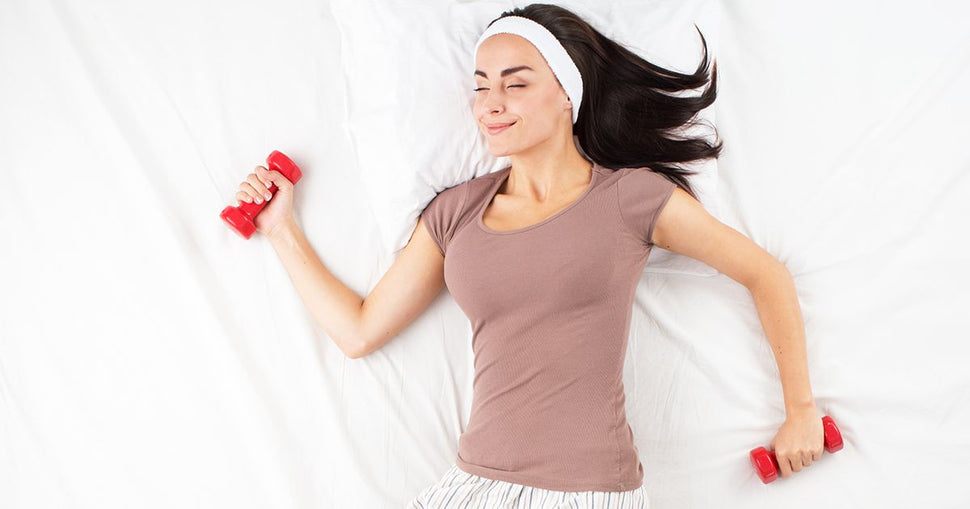Here's why it's okay to exercise before bed
30 Aug 2021
For decades, experts and athletes commonly believed that exercising too close to bed time was bad for sleep. In recent years, however, with increasing research into and new studies on the topic, views and pre-bed exercise are changing. Read on to find out why it’s A-okay to exercise before bed—as long as you do it right.
How we fall asleep
As your body prepares to drift off to sleep, your heart rate drops, your breathing slows down and your body temperature declines. During about 8 hours of sleep—the average amount recommended by scientists—your brain goes through 4-6 sleep cycles – starting with Non-Rapid Eye Movement or NREM sleep, moving into Rapid Eye Movement or REM sleep, and then drifting into NREM sleep again and so on and so forth. Both NREM and REM sleep are necessary for tissue growth and repair, memory and learning.
Exercise before sleep: Is it good or bad?
For many years, experts advised against exercising at night. When you engage in intense physical activity, your heart rate increases, your breathing becomes faster and your core body temperature rises. It was thought that this state of arousal would hamper your body’s ability to enter into the first NREM stage of the sleep cycle, and people were advised to not exercise before sleeping at night.
What does the research say?
A 2018 study conducted by researchers from the Institute of Human Movement Sciences and Sport at ETH Zurich found that exercise before sleep does not affect sleep quality and (1), on the contrary, has a positive effect on sleep. Subsequent studies on the topic have reiterated these findings.
However, as discovered by a 2019 study by researchers at Central Queensland University, exercise intensity plays an important role here (2). Exercises of moderate intensity will not impact your ability to fall asleep. However, rigorous physical activity like high-intensity interval training can impact sleep due to elevated blood pressure and heart rates.
Best workouts to do before bed
Experts recommend getting at least 150 minutes of exercise per week, or 30 minutes of exercise five days a week (3) To fulfil this quota, you might find yourself having to exercise at night sometimes, especially if you’re just had a hectic work day. If you have to workout before sleep, yoga, stretching, walking, light weightlifting and a leisurely bike ride or swim are physical activities you can indulge in without worry.
Avoid vigorous workouts like running, swimming fast laps, skipping, speed cycling, or HIIT routines. Try to complete your workout at 60-90 minutes before bed as this will give your body sufficient time to unwind.
How much exercise is helpful for sleep?
Regular exercise can help you sleep better. It reduces anxiety and stress, helps you relax, and can even stimulate the release of melatonin and reset your body’s internal clock (4). To improve your sleep quality, you must try to exercise every day.
30-minute workouts 5 days a week are ideal, and if you want something a little more intense, 75-minutes of high-intensity workouts each week are also recommended. In order to stay consistent, pick a form of exercise you enjoy, If you dislike running on a treadmill, opt for a dance workout instead. If yoga doesn’t work for you, try weightlifting instead.
Don’t fret over the type of workout—focus instead on being consistent.
Tips for sound sleep
Apart from regular exercise, you can help your body fall asleep faster by creating the right sleep environment for yourself. Your bedroom should be dark, cool and quiet. Stay away from gadgets for at least an hour before bedtime. Have a warm bath before bed and listen to soothing sounds like white or pink noise. You can also try sleeping naked to fall asleep faster.
Melatonin sleeping aids can also improve your sleep quality. Setu Sleep:Restore is a non-habit forming melatonin supplement that regulates your sleep cycle. It aids in relaxation, helps you fall asleep faster, and even reduces daytime sleepiness!
FAQ
1) Is exercising before sleep advisable for people with high blood pressure?
There isn’t much research yet into the effects of moderate to intense exercise on sleep for people with high blood pressure. Light exercises such as yoga are not a problem for most, but it’s always better to check with your doctor before making any changes to your exercise routine.
2) Is exercising in the morning better than exercising in the evening?
Research has found that exercising in the morning boosts mood, realigns your circadian rhythm and promotes deep sleep. That’s not to say, however, that you don’t derive health benefits by exercising in the evening. You can exercise at any time that fits your schedule as long as you finish at least 90 minutes before hitting the sack.
3) Do melatonin supplements have side-effects?
Setu Sleep:Restore is a non-addictive supplement that does not cause any side-effects. Each mint-flavoured strip contains only 5mg of natural melatonin, which is designed to imitate the body’s production of this hormone. Melatonin simply tells your body that it’s time to fall asleep, and it causes no other side-effects.
Skin: Renew - Glutathione - Orange Flavour
- ₹1,794
- ₹1,794
-
₹2,600 - ( 31% OFF)
Categories
- Choosing a selection results in a full page refresh.
- Press the space key then arrow keys to make a selection.
this is the sidecart










